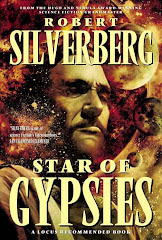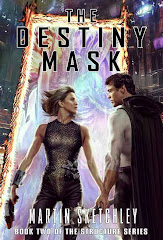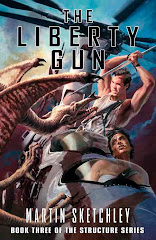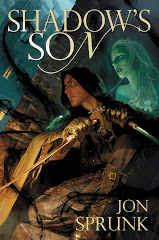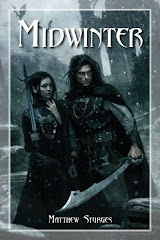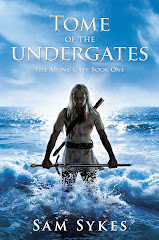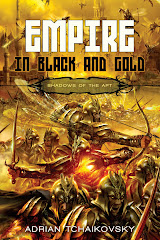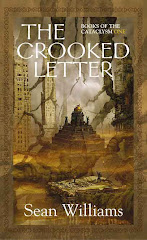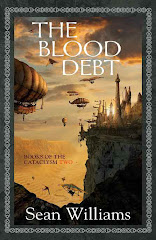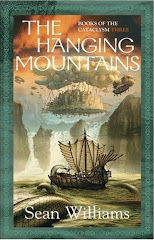Wilson Cole sat alone at his table in the small, cramped mess hall of the Theodore Roosevelt, sipping a cup of coffee, when he received the transmission from the bridge.
“We’re all in position, sir,” said Christine Mboya, the slender black woman whose image suddenly appeared before him.
“Has Mr. Briggs analyzed their capabilities yet?” asked Cole.
“Level 2 pulse cannons, Level 3 lasers.”
“Okay, nothing to worry about. Let me speak to the Valkyrie.”
An instant later the face of his Third Officer, an exceptionally tall redheaded woman, appeared above Cole’s table.
“What is it?” she asked.
“Pass the word, Val. I want all of our ships except this one to stay out of firing range.”
“Why?” she demanded. “Are we here to engage the enemy or aren’t we?”
“They can’t do the Teddy R any damage, but they can pierce most of the smaller ships’ defenses.”
“Not if we destroy them first.”
“Just do what I tell you to do,” said Cole. “With a little luck we won’t have to destroy anyone.”
“Some war!” she snorted, and broke the transmission.
“Christine?”
“Sir?”
“Is Four Eyes down in the Gunnery section?”
“Commander Forrice is on his way there,” she answered. “One moment, sir.” Pause. “He’s arrived.”
“Let me speak to him.”
The image of a burly member of the tripodal Molarian race appeared, surrounded by computerized controls for the ship’s armaments.
“Everything’s ready,” said Forrice. “Just say the word.”
“How big a crew have you got down there?”
“Four, counting myself.”
“That’ll be enough if we need it,” said Cole. “No one fires except on my express order.”
“Even if we’re under fire ourselves?”
“Even so. They don’t have anything that can damage us.”
“You’re the Captain,” said Forrice.
“Thanks for remembering,” said Cole dryly, ending the transmission.
He finished his coffee, considered going to the bridge, decided there was nothing he could do there that he couldn’t do where he was, and contacted Christine Mboya again.
“Sir?” she said.
“Have we pinpointed Machtel’s headquarters yet?”
“No, sir. They’re maintaining radio and video silence.”
“Can’t say that I blame them,” said Cole. “If it was me, I wouldn’t want to let a superior force know where I was holed up either.” He shrugged. “Okay, negotiating in private would have been easier, but it’s time to get this show on the road. Put me on audio and video, broadest possible bandwidth.”
“Done,” she announced. “Start whenever you’re ready.”
He chose one of the cameras that monitored the mess hall and stared into it. “This is Wilson Cole, Captain of the Theodore Roosevelt. This message is for Machtel, or, if he is no longer in charge, whoever is running his organization. My fleet has been commissioned by the government of the Pirelli Cluster to rid it of the warlords who have taken it over. I’m sure you are aware that we have already deposed the Cluster’s two other warlords—the human Chester Braithwaite and the Canphorite Grabius. You are all that remains.”
He paused for almost half a minute, long enough for them to start getting nervous wondering if he was going to speak again or if he’d said his piece and was about to start firing on them.
“You have nine ships on the ground and three more docked in orbit. I’m sure you have analyzed our strength, but just in case you haven’t, let me inform you that you are facing a fleet of forty-three ships, many of them with greater firepower than any of your own.”
He broke the connection and poured himself another cup of coffee.
“That’s it?” demanded Val, whose image popped into view again. “That’s all you’re going to say?”
“Of course not,” replied Cole. “But let them worry about it for a few minutes.”
“Right now they’re probably getting us in the sights of every weapon they own.”
“Right now they’re counting our ships and analyzing our defenses,” answered Cole calmly. “In another minute they’ll realize I wasn’t lying, and then we’ll continue the conversation.”
“It’s been a pretty one-sided conversation so far,” noted Val.
“I haven’t asked them to say anything so far.”
Suddenly Malcolm Briggs’s voice came over the ship’s intercom, though not his image. “Incoming! Pulse and laser fire!”
“Solely at us?” asked Cole.
“No, sir. They’re also targeting Mr. Sokolov and Mr. Perez.”
“I trust they’re out of range?”
“Yes, sir.”
“Okay. Tell Christine to wait thirty seconds and then put me on again.”
“I’ve pinpointed the source of the pulse fire,” announced Forrice from his post in the Gunnery section. “You want me to take it out?”
“I want you to do nothing without an express order from me,” said Cole.
“That’s what I was requesting—an express order.”
“No.”
“You’re on in five seconds, sir,” said Christine.
Cole cleared his throat, counted to five, and began speaking.
“This is Wilson Cole again. I trust you’ve convinced yourself that you’re not about to inflict any damage on us. The corollary is that we can annihilate you in less than a minute.”
A brief pause.
“However, we have no desire to cause you any damage or loss of life. We are not conquerors, we are not warlords, and we are not criminals. We are a mercenary force, hired by the authorities of the Pirelli Cluster to put an end to your aggressive and illegal domination of the local star systems. And I should note that in this instance we are an overwhelming mercenary force.
“We have now reached the point where decisions must be made,” he continued. “We are confiscating the three docked ships. Any of you on the planet can surrender and pledge your allegiance to my fleet. If you do so, you will not be harmed—but you will not be left in control of your ship. Two of my men will be installed as Captain and First Officer until such time as you have proven your trustworthiness, and any disloyalty will be punishable by death. Those of you who choose this option should take off immediately and put your ships in orbit around the fifth planet in the system. If you do not wish to meet us in combat or join us as an ally, fly your equivalent of the white flag and leave the cluster immediately, via the Landrigan Wormhole, and you will not be fired upon . . . but you will never be allowed to return. Your third and final alternative is to remain where you are and meet us in combat. You have ten Standard minutes to make your decisions, after which combat will commence.”
He broke the transmission, considered having yet another cup of coffee, decided not to, and took an airlift up to the bridge, where Christine Mboya, Malcolm Briggs, Val, and the alien Domak were manning their stations.
“Any response yet?” he asked as he arrived.
“Five ships have signaled that they want to join us,” answered Christine, “and are heading to the fifth planet.”
“Tell Jacovic to monitor them, and take out any ship that heads that way and doesn’t go into orbit.”
“Two white flags, sir,” announced Briggs.
“Tell Sokolov to take a couple of ships, follow them to the wormhole, and make sure they enter it,” said Cole. “What’s left?”
“Two ships, sir,” said Domak, a warrior-caste Polonoi, her muscular body covered with natural armor. “I’ve identified one as belonging to Machtel.”
“Got him in my sights,” said Forrice’s voice.
“Forget it,” said Cole. “He’s not going to stand his ground.”
“He hasn’t moved yet,” said Forrice.
“He’s just proving how tough he is. He’s got a couple of minutes left.”
“The other ship is heading to the fifth planet, sir,” said Briggs. “That leaves just Machtel.”
“He’s probably not the type to take orders,” said Cole. “I’ll give plenty of ten-to-one that he heads for the wormhole rather than the fifth planet.”
“He’s not heading anywhere,” said Forrice.
“He will,” said Cole. “This isn’t his planet. Every other ship has already left. He won’t prove anything by dying. We’re just doing to him what he did to whoever was here before him, and we’re doing it a lot more humanely.”
“A humane war!” snorted the Molarian.
“Whose life do you want me to trade for Machtel’s?” asked Cole. “Yours? Val’s? Mine?”
“You don’t have to trade anyone’s life,” said Forrice. “We can kill him. He can’t harm us.”
“Whether we kill him or let him escape, we accomplish our mission,” replied Cole. “And by doing it this way, word will spread to future opponents that they don’t have to fight to the last man, that we’re not in the punishment or retribution business, that we’re just as happy to achieve a bloodless victory.”
“Sir?” said Briggs.
“Yes?”
“Machtel just took off. He’s heading for the wormhole.”
“Good. Tell Jacovic to take eighteen ships out to the fifth planet, put our new members in a tight formation, englobe them, and escort them back to base. That ought to discourage any foolhardy heroes among our new recruits.”
Val looked up from her control panel. “You really want to give this asshole a free pass?”
“Machtel? I promised him one.”
“He’s just going to be more trouble in the future,” she said. “The other ships have already entered the wormhole. We could take him out and no one would be any the wiser.”
“And when he didn’t show up at the other end, you think the others won’t know what happened?”
“So what if they do?” she persisted.
“Then before long far more powerful forces than his would know they could never trust our word again.”
She shrugged. “All right—but if you change your mind, we’ve got thirty seconds before he reaches the wormhole.”
“How the hell did I manage to assemble such a bloodthirsty crew?” Cole said wryly. “I feel a need to speak to someone who’s glad that we didn’t blow nine ships to hell and gone.” He walked over to a bulkhead and tapped his fingers against it. “Come on out, David.”
The bulkhead slid open, and an odd-looking creature of vaguely human proportions, but dressed like a Victorian dandy, stepped out onto the bridge. His eyes were set at the sides of his elongated head, his large triangular ears were capable of independent movement, his mouth was absolutely circular and had no lips at all, and his neck was long and incredibly flexible. His torso was broad and half again as long as a man’s, and his short, stubby legs had an extra joint in them. His skin may have possessed a greenish tint, but his bearing and manner were properly upper-class British at all times.
“Is it over?” he asked.
“It was a nonevent,” said Cole.
“The bigger our fleet becomes, the more nonevents we can expect to have,” said the alien approvingly.
“We just added eight more ships,” Cole informed him. “Five from the planet, three that were docked in orbit.”
“So we’re up to fifty-one?”
Cole nodded. “If they all work.”
“You’re going to make it harder and harder for me to solicit contracts that will cover all our expenses.”
“The burdens of success,” replied Cole. “I suppose we could attack a Republic convoy. That ought to put a huge dent in our expenses by the time we escaped.”
“It’s unkind of you to make fun of me, Steerforth,” said the alien.
“I’m open to suggestions,” replied Cole. “Who would you like me to make fun of?”
“Why are you being like this?” asked the alien.
“I apologize, David,” said Cole. “It’s just that we should all be celebrating a victory where we didn’t have to fire a shot—but I get the distinct impression that most of my senior officers would rather engage in armed conflict.”
“Well, you are a military ship and crew,” noted the alien. “War is what most of you have trained for all your adult lives.”
“No sane man wants to go to war,” said Cole. “These aren’t expendable chess pieces under my command. They’re living beings, and it’s my job to keep them alive.”
“I agree,” said the dapper alien. “You have to be quite insane to face the possibility of losing a battle.”
“Which is why you sit them out hiding inside a bulkhead,” noted Cole.
“Resting, not hiding,” shot back the alien. “I’m the Teddy R’s business agent, not one of its lieutenants—and as a rational and foresightful business agent let me predict that there will be no more pitched battles in our future. Our fleet is growing larger and more powerful almost by the week.”
“Yeah,” agreed Cole sardonically. “Eight or ten million more ships and we can meet the Republic on even terms.”
“Make fun of me if you wish,” said the alien, “but I’m telling you that you will not see another armed conflict or my name isn’t David Copperfield.”
“I hate to point it out,” said Cole, “but your name isn’t David Copperfield.”
“How can you say such a thing, Steerforth?” demanded David.
“Possibly because my name isn’t Steerforth.”
“Details, details,” said Copperfield. “People take the names they want on the Inner Frontier. I took David.”
“I didn’t take Steerforth,” said Cole.
“It is my gift to you, courtesy of the immortal Charles.”
“You and Mr. Dickens can have it back,” said Cole. “I just hope you’re more accurate about your military predictions than your name.”
Cole had the uneasy feeling that some nameless god of the spaceways grinned sardonically and silently mouthed the words: Well, you can hope.
2
It wasn’t home—that was the Teddy R—but it was headquarters.
It was Singapore Station, perhaps the most remarkable structure on the Inner Frontier. Its genesis went back some eleven centuries, to the 883rd year of the Galactic Era, when two small space stations, built midway between the Genoa and the Kalatina systems, were splitting the business in a sector that could support only one station. In desperation their owners decided to form not just an economic partnership, but a physical one as well. The two stations were moved to a midpoint between the systems by space tugs. Workmen and robots labored for three Standard months, joining them physically—and when they reopened they found that business was booming.
Others saw and learned and copied, and by the fourteenth century G.E. there were dozens of such super-stations across the Frontier. They found that the bigger they were, the more services they could provide—and the more services they could provide, the more clientele they could attract, so they kept combining and growing.
By the time Cole and his crew first docked at it, almost two hundred such stations had combined into one super-station—Singapore Station—that was as heavily populated as any colony world, and measured some seven miles in diameter. It consisted of nine levels, with docking facilities that could handle almost ten thousand ships, from huge military and passenger vessels to the little one- and two-man jobs that were commonplace on the Frontier.
Singapore Station was well named and well located. An interstellar gathering place reminiscent of the fabled international city back on old Earth, it was halfway between the Republic and the huge black hole at the galactic core. Warring parties—and there were always wars going on in the galaxy—needed a Switzerland, a neutral territory where all sides could meet in safety and secrecy, where currencies could be exchanged, where men and aliens could come and go regardless of their political and military affiliation, and Singapore Station filled that need.
It was also a wide-open venue. Whorehouses, catering to all sexes and species, abounded. So did bars, drug dens, casinos, and huge open “gray markets.” (By definition no item was illegal or contraband on Singapore Station, so there couldn’t be any black markets.) There were elegant hotels, comparable to the finest on Deluros VIII. There were gourmet restaurants, side-by-side with slop houses, as well as alien restaurants catering to more than one hundred non-human species.
Four of the nine levels possessed what had come to be known as Standard gravity and atmosphere, though no one knew if that was Earth Standard or Deluros VIII Standard (and since they were almost identical, no one really cared). There was a level for chlorine breathers, one for methane breathers, another for ammonia breathers, and one small section with no atmosphere at all, where space-suited men and space-suited aliens could meet as uncomfortable equals. A middle level provided automatic transport for all.
Cole had chosen Singapore Station as the headquarters for his rapidly growing fleet of ships the first time he set foot on it a year earlier. It was the one place on the Inner Frontier where he trusted the security, where he could replenish his supplies, and where he could make contact with those who might be interested in hiring the services of the Teddy R and its sister ships. Though David Copperfield still negotiated Cole’s end of the contracts, he didn’t have enough contacts to solicit sufficient work to keep Cole’s small but growing navy busy—but there was one man who did, and that was the man who ran Singapore Station. Known as the Platinum Duke for his multitude of platinum prosthetics—not much of the original man remained on the exterior except his tongue, lips, and sexual organ—he had formed a partnership with Cole that had proved profitable to both parties.
The Duke also owned a large casino known simply as Duke’s Place, and it was the unofficial hangout of the Teddy R’s crew. The Duke himself kept a large table at the back of the casino where Cole and his officers were always welcome, and where there was no tab for food or drink.
Cole entered the casino and walked past the human and alien games to the Duke’s table, accompanied by his Chief of Security, Sharon Blacksmith, and David Copperfield. Val had accompanied them as far as the entrance, but made a beeline for the gaming tables the moment she entered. The Duke’s security system alerted him to their presence, and he emerged from his private office, looking far more robotic than human, to greet them as they reached the table.
“I hear you took care of Machtel without firing a shot,” said the Duke. “That’s, what, three in a row?”
“It makes more sense to assimilate the ships and crew than destroy them,” said Cole, pulling a chair out for Sharon and then seating himself. A robot approached, and he ordered drinks for himself and Sharon. “You want anything, David?”
“A bottle of Cygnian cognac,” replied the dapper little alien.
“Come on, David,” said Cole. “Your metabolism can’t handle our stimulants.”
“I know,” replied Copperfield. “But I don’t have to open it. I’ll just let it sit here on the table in front of me for atmosphere.”
“Fine,” said the Duke. “If you don’t open it, I can sell it later.”
“You’ll have to forgive him,” said Cole. “He gets a little more obsessed every day. I can’t believe he hasn’t visited one of the whorehouses here.”
“David Copperfield would never frequent a brothel!” said the alien heatedly.
“I stand corrected,” said Cole.
“How many of Machtel’s ships and crew did you confiscate?” asked the Duke.
“Eight ships, fifty-seven Men and aliens,” answered Cole.
“That’s quite a fleet you’re accumulating,” said the Duke. “You’re going to run out of challenges before too long.”
“We’ve faced challenges,” replied Cole. “Trust me, they’re overrated.”
“Besides, we can’t go getting him shot up now that I’ve finally got him trained,” said Sharon.
“Decorum forbids me from asking what you’d got him trained to do,” said the Duke, his human lips smiling in his platinum face. He looked over at the Valkyrie. “You’d think she’d stop by and say hello.”
“She will, after she’s beaten your table or blown all her money,” said Cole. “You know her.”
“I still wish she’d hire on right here. I never saw anyone who could spot a cheater quicker, and I’ve never seen the human or alien who could beat her in a fight.”
“She’s quite remarkable,” agreed Copperfield.
“I need her right where she is,” said Cole.
“You wouldn’t be happy with her anyway,” added Sharon. “Wilson’s the only person she’ll listen to.”
“Why is that?” asked the Duke.
“Because he’s never wrong,” said Copperfield. “Except when he disagrees with me.”
“Funny,” added Sharon with a smile. “I was about to say the same thing.”
“Ah!” said the Duke, looking across the room. “I see Commander Jacovic has joined us.”
“He was a little late getting in,” replied Cole. “I had him escort the new ships back, just in case one of the them tried to pull anything funny.” He waved his hand to catch Jacovic’s attention, and the tall, thin Teroni walked across the room and joined them.
“Welcome back, Commander Jacovic,” said the Duke.
“I am just Jacovic now,” replied the Teroni. “I am no longer an officer in the Teroni Navy.”
“Commander of the Fifth Fleet, to be exact,” said Cole.
“That’s in the past. We are no longer enemies, and neither of us is a member of any Navy.”
“Except our own,” said Sharon. “The only difference between you and Wilson is that the Teronis haven’t offered a ten-million-credit reward for you, dead or alive,” said Sharon. “The Republic’s Navy is somewhat less enamoured of our Captain.”
“Out here that’s a badge of honor,” remarked the Duke. “In fact, it makes you a hero. The fact that you were justified, that you actually saved millions of Republic lives by forcibly replacing your captain, doesn’t quite detract from the fact that you are the most wanted criminal in the galaxy.”
“How comforting,” said Cole dryly.
“And by the way, the reward is now up to twelve million,” added the Duke.
“Whoopie,” said Cole unenthusiastically.
The Duke studied Cole’s face. “Our hero looks neither pleased nor proud. Why not?”
“We both know the Navy’s not going to send a major fleet to the Frontier after the Teddy R as long as they’re in a war with the Teroni Federation,” answered Copperfield. “But if they keep making the reward bigger and bigger, then sooner or later, despite your security, Singapore Station is going to be crawling with bounty hunters.”
“It won’t happen here,” the Duke assured him. “Whoever accepts the contract will want to live long enough to spend it.”
“You can stop one killer,” continued Sharon. “But what if twenty of them form a partnership? That’s still better than half a million a man.”
“Enough,” said Cole. “The risks go with the job.”
Sharon was about to reply when they heard a cry of triumph from across the room.
“She beat your jabob game,” noted Cole, referring to the alien gaming table where Val was holding up a fistful of cash.
“It would be so much cheaper to have her work for the house than play against it,” muttered the Duke.
A robot delivered a bottle of whiskey to Val.
“Not to worry,” said Cole. “She’ll chug-a-lug a couple of bottles of booze and probably wind up losing it all back to you.”
“Remarkable lady,” said the Duke.
“She’s got her share of rough edges,” agreed Cole. “But when the chips are down, she’s the one I want protecting my back.”
“Just so long as she leaves your front alone,” said Sharon.
Suddenly the Duke summoned a robot. “Where are my manners?” he said. “What will you have to drink, Commander?”
“Just Jacovic,” the Teroni corrected him. “And if it’s all right with you, I think I would prefer to eat.”
“My kitchen is at your disposal.”
“Meaning no disrespect, but there is a restaurant three levels down that specializes in Teroni food,” said Jacovic. “I just stopped in to tell Captain Cole that we returned without incident, and to say hello to you.” He got to his feet.
“You’ll be back later?” asked the Duke.
“Yes.”
“Give me the name of the restaurant and I’ll see to it that there’s no charge.”
“Thank you,” said Jacovic, “but I prefer to pay.”
He turned and headed to the door.
“A little anti-Man sentiment there?” asked the Duke.
“No,” answered Cole. “A little pride.” He shrugged. “Besides, out here he’s got nothing to spend it on.”
“We have that in common,” said a familiar voice.
Cole turned and saw Forrice, his First Officer, spinning toward the table with his remarkably graceful three-legged gait. The burly Molarian, whose tripodal structure made sitting on chairs crafted for humans all but impossible, waited until a robot brought him a seat that had been made especially for him.
“I thought you were busy spending all your money, Four Eyes,” remarked Cole when Forrice finally seated himself.
The Molarian’s reply was a guttural growl.
“What happened?”
“Guess,” muttered Forrice.
Suddenly Cole grinned in amusement. “Wrong time of year?”
“It’s not funny!” snapped Forrice. “You and Sharon have sex whenever you want, which is altogether too often if you want my opinion, but Molarians are different. Our females are seasonal.”
“And the Molarian whorehouse didn’t have any in season?”
“Not one!”
“Poor baby,” said Sharon sympathetically, and neither Cole nor Forrice could tell if she was sincere or teasing him.
“So what do you do now?” asked Copperfield.
“It all depends,” said the Molarian. “Have you and the Duke gotten us another assignment yet?”
“No,” said Copperfield. “Steerforth wanted to give the crew a week’s shore leave. Well, Singapore Station leave, anyway.”
“Then maybe I’ll borrow one of the shuttles,” said Forrice. “There’s supposed to be a Molarian whorehouse over on Braccio II. I could be there and back in three days’ time.”
The Duke shook his head. “You don’t want to go anywhere near there, Forrice,” he said.
“Oh? Why not?”
“There are a couple of hundred Navy ships in the vicinity,” said the Duke. “At least, they were there two days ago.”
“What the hell are they doing out here?”
“The usual,” answered the Duke. “Forcibly recruiting cannon fodder. Plundering agricultural planets for supplies. Appropriating fissionable materials from a trio of mining worlds. Pacifying a couple of worlds that have somehow annoyed them. And then explaining that they were doing it all for our own good. You know the Navy.”
“We all know the Navy,” said Sharon. “We were in it. That’s why we can never go back to the Republic.”
“Anyway, I hate to put a damper on your love life, Forrice,” continued the Duke, “but I’d stay away from there until we get definite word that the Navy has left.”
“It’s a damned lucky thing Molarians don’t believe in God,” muttered Forrice. “Because if we did, I’d be sure He hated me.”
“He’s probably just having a little fun at your expense,” said Cole. He put an arm around the Molarian’s shoulders. “Come on, Four Eyes. It’s just another week. You’ve waited half a Standard year, you can wait a few more days.”
“I know, I know,” said Forrice glumly. He got to his feet. “I’m going to wander the streets feeling sorry for myself. If I’m lucky, maybe some mugger will attack me. I’ve got a lot of extra aggression tonight.”
He turned and headed out of the casino.
“Poor bastard,” remarked Cole. “Nature played a hell of a trick on the Molarians. The females are seasonal, but the males are always ready.”
“You’re very fond of him, aren’t you?” asked the Duke.
“He’s been my closest friend for, I don’t know, twelve or thirteen years.”
“I find that surprising.”
“Why?” said Cole. “Molarians are the only race besides Man with a sense of humor. He’s smart, he’s witty, he’s brave, he’s loyal, and”—Cole smiled—“he leaves Sharon alone, even at times like this.”
“Well,” said the Duke, “how about dinner?”
“Yeah, we could use some real food after all those damned soya products on the ship,” said Cole. “What have you got tonight?”
The Duke recited the day’s menu, Cole and Sharon made their choices, David Copperfield ordered a steak that they all knew he wasn’t going to touch, and a few minutes later the meal was served.
And five minutes after that, Val walked over and sat down with them.
“Ah, the lovely and remarkable Valkyrie!” said the Duke by way of greeting.
“Can it,” she said. “I’m not in the mood.”
“You lost it that fast?”
“Shut up and give me something to eat.”
“She lost it that fast,” Cole confirmed with a smile.
Val glared at him, and Sharon decided he was the only living entity in the galaxy who could have said that without being decapitated two seconds later.
3
Cole made his way to the Teddy R’s security section, where he found Luthor Chadwick, Sharon Blacksmith’s second-in-command, sitting in front of a bank of monitors, keeping a watchful eye on all crew members who remained onboard the ship.
Chadwick snapped him a salute. “Hello, sir,” he said. “What can I do for you?”
Cole resisted the urge to tell him to stop saluting. “Is your boss in her office?”
“Yes, sir.”
“Alone, or still interviewing our new recruits from Machtel’s crew?”
“I believe she’s alone, sir.” He checked a monitor. “Yes, sir. She’s finished the last of them a few minutes ago.”
“Good. That’s what I want to talk to her about.”
Cole approached the door to Sharon’s office, which instantly read his retina and bone structure, and irised to allow him to step through.
“How’s it going?” he asked.
Sharon leaned back on her chair. “I’d call them a mixed lot.”
“You want to expand on that?”
“They’re outlaws and cutthroats, Wilson.”
“So are we, except for the cutthroat part,” replied Cole. “How many can we work with?”
“Well, you’ve got three who are borderline psychopaths and one who crossed that border years ago. I suppose we can fit the rest in.”
“Okay,” said Cole. “That’s still fifty-three more crew members. Give me the names of the four crazies.”
She ordered her computer to print out the four names.
“Thanks,” he said, taking it from her. “The sooner we get the bad eggs off the ships, the less contamination we risk.”
“I’d be very careful handling them, Wilson,” she said. “You’ve got a couple of real killer-dillers there.”
“Well, if you’re going to keep a few systems under your thumb the way Machtel did, I suppose you need some real killer-dillers.”
“What do you plan to do with them?” asked Sharon. “We can’t just turn them loose on Singapore Station.”
“I know,” said Cole. “I suppose I could just have Val beat the shit out of them twice a day until she’s broken their spirits.”
“Seriously.”
“Seriously? We’ll confiscate their weapons and dump them on some world that’s got a competent police force. If I can’t turn them loose in Singapore Station, and I agree that I can’t, I sure as hell can’t turn them loose on some little pastoral farming world. They’d rob and kill the first family they came upon and swipe their ship.”
“Well, when you decide exactly where you’re placing them, let me know so I can notify the authorities.”
“Will do,” said Cole. “In fact, I suppose I’d better get the ball rolling. Lunch later?”
“Here or the station?”
“The station has real food, the Teddy R has soya products. Which do you think?”
She smiled. “I’ll meet you at Duke’s Place in a couple of hours.”
“Fine.”
He turned and left her office, walked out of the security section to a nearby airlift, took it down two levels, got off, and approached the smallish room that had been turned into a very undersized gymnasium. He entered it and found himself facing Eric Pampas, a muscular young man, and the Valkyrie. Both were lifting weights, weights Cole was sure no one else on the ship, even some of the sturdier aliens, could budge.
“Good morning, sir,” said Pampas, putting his barbell on the floor and saluting.
“Good morning, Bull,” replied Cole. “Are you two just about done?”
“Another five minutes,” said Val. “What’s up?”
“Sharon’s interviewed the new crew, had the computer run psych tests on them, and she tells me we’ve got four serious nutcases.”
“Only four?” said Val, lifting her weight again. “That’s better than last time.”
“I’ve got a list of their names. Jacovic is keeping an eye on all the new crew members aboard the Silent Dart until they receive their ship assignments. I want you to pull these four out and—”
“—beat a little obedience into them?” concluded Val. “Good. Bull needs the exercise. I’ll lend a hand if he needs it.”
“Try not to understand me so fast,” said Cole. “I want you and Bull to load them into the Red Sphinx. Stay with them until you land, make sure they’re not in the middle of a desert or a wilderness, give them back any weaponry they’ll need to defend themselves but nothing powerful enough to cause any serious problems to the local constabulary—I’ll leave it to your judgment—and then have Perez bring you back to Singapore Station.”
“We could kill them right now and save a lot of trouble,” said Val. “You set ’em loose on some third-rate world and they’re likely to feel betrayed and resentful.”
“Why?” said Cole. “We could have destroyed them back in the Pirelli Cluster, but we let them live.”
“If they were sane enough to take that into account, you wouldn’t be dumping them, would you?” replied Val.
“Val, we’re not cold-blooded killers,” said Cole. “Well, some of us aren’t,” he amended. “Just do what I tell you to do.”
“I hope they decide they don’t want to go,” she said.
“Bull,” said Cole, turning to the young man, “if that’s the case, make sure it was their decision and not hers.”
Pampas, finding himself between the Captain and the Third Officer, nodded an agreement but didn’t salute, which seemed to satisfy both of them.
“Okay,” said Cole. “Finish up, shower, and get over to the Silent Dart in an hour. By the time you transfer them to the Red Sphinx, Perez will know where you’re going.”
Cole left the room and took a different airlift up to the bridge, where he found young blonde Rachel Marcos sitting at the computer complex.
“Good morning, sir,” she said, standing and saluting.
“Good morning. I’ve lost track of the time. When is Christine back on duty?”
“It’s still red shift for another two hours, sir. She’ll come on when it’s white shift.”
“I need some information sooner than that,” said Cole, frowning. “Hunt up the three nearest nonagricultural oxygen worlds possessing organized law enforcement and reliable medical and transportation facilities.”
She spoke a code that he didn’t understand, and a moment later the computer threw up a holograph of the sector, with Singapore Station and three reasonably close worlds brilliantly highlighted.
“Any immigration restrictions on any of them?”
Another coded statement. “Yes, sir. Niarchos IV is currently closed to human immigration.”
“Which of the other two has the larger police force?”
She asked the computer, and suddenly only one planet was flashing. “Mirbeau III, sir.”
“Thanks. That should do it.”
Cole walked over to stand beneath the half-sling half-cocoon that held Wxakgini, the Bdxeni pilot whose race never slept and whose neural circuits were wired into the ship’s navigational system.
“Pilot,” said Cole, who had long since given up trying to pronounce Wxakgini’s name, “are there any wormholes between our present location and Mirbeau III? You can get its coordinates from the computer.”
“Yes,” answered Wxakgini, whose response to Cole’s inability to learn his name was to never call Cole “sir.” “The Yoriba Wormhole will let a ship out near the fourth planet of the Mirbeau system.”
“Transit time from Singapore Station?”
“Utilizing the wormhole, four hours and seventeen minutes,” replied the pilot. “Through normal space at light speeds, just under four days.”
“Okay, thanks,” said Cole. He turned back to Rachel. “Contact Mr. Perez. Tell him he’s about to be visited by Val, Bull, and four of Machtel’s men. Have him warn his crew that the men are highly dangerous, and to keep clear of them. He’s to utilize the Yoriba Wormhole and drop them off on Mirbeau III.”
“Should I clear it with the planetary authorities first, sir?” asked Rachel.
Cole shook his head. “What if they say no? Tell Sharon to alert them after Perez has dropped off his cargo and is heading back to Singapore Station.”
“Yes, sir.”
“By the way, has Four Eyes returned to the ship yet?”
“I believe he’s in the mess hall, sir.”
“Thanks,” said Cole, heading off to an airlift. He descended to the mess hall, entered it, saw Forrice sitting alone at a table, and joined him.
“Up to a little work this afternoon?”
“We don’t have afternoons in space,” replied the Molarian.
“I know, but it’s easier to say than ‘Up to a little work this white shift?’”
“What did you have in mind?”
“Val and Bull Pampas are about to separate the psychos and put them down on an innocent, unsuspecting planet,” said Cole. “I’d like you, Jacovic, Domak, and Sokolov to take the remaining recruits and their ships out and put them through some more exercises and see what they can do. We know they can terrorize innocent planet-dwellers; let’s see if they can take orders and execute military maneuvers.”
“I suppose it makes sense,” agreed Forrice. “If there are anymore washouts, we might as well find out now.”
“I want you aboard that class-K ship, the one called Hummer.”
“Any reason why?”
Cole nodded. “It has an all-human crew. I want to make sure they’ll take orders from a member of another race.”
“What they do now and what they’ll do when they’re under fire may not be the same thing,” noted Forrice.
Cole shrugged. “Perhaps not, but we’ve got to start somewhere.”
“All right,” replied the Molarian. “I’ll let Jacovic devise the exercises. He’s got a command of military maneuvers that even impresses me.”
“That’s why he was in charge of the Fifth Teroni Fleet. At one time I think he had over ten thousand ships under his command.” Cole paused. “We haven’t needed him yet, knock wood, but when we finally do, we’re going to be damned glad we’ve got him.”
“We fought against each other for years,” remarked Forrice. “I’m surprised he doesn’t feel any animosity toward us.”
“Do you feel any toward him?”
“No,” admitted the Molarian. “The way I view it, we were all just soldiers doing our job.”
“There’s your answer,” said Cole.
“Also, the one time we confronted him, he had us dead in his sights, and he behaved like an honorable being,” continued Forrice. “There aren’t a lot of those in any race.”
“You never know where an honorable being will crop up,” agreed Cole. “Or even a competent one.”
“Maybe we can spot one during the exercises this afternoon,” offered Forrice.
“I doubt it,” said Cole. “If he was honorable, he wouldn’t have been working for Machtel, and if he was competent, he’d have deposed Machtel and taken over his operation by now.”
The Molarian stared at his old friend for a long moment. “You know,” he said at last, “I just hate it when you make sense. So many problems were simpler when they only had me thinking about them.”
“I apologize.”
“Damned well better,” growled Forrice.
“You’re a little ray of sunshine today.”
“Guess why.”
“The Navy will clear out in another day or two, and you can spend a week fucking your brains out on Braccio II.”
“Two weeks.”
“I don’t want you coming back so thin that we have to carry you to your post every day.”
“You’ve been sharing your bed with Sharon for almost two years, and it hasn’t cost you any weight.”
Sharon’s image popped into view. “That’s because he just lies there and I do all the work.”
“You were listening?” asked Cole.
“I’m the Chief of Security. It’s my job to be nosy.”
“I’ve changed my mind,” said Cole. “Four Eyes, if you want her you can have her.”
“If the Navy sticks around another week,” replied Forrice with a hoot of alien laughter, “I may take you up on that.”
After the Molarian had finished his meal and left, Sharon’s image appeared opposite Cole again.
“You know,” she said seriously, “I’m hardly shy, and I haven’t been virginal in a long time—but I find the crew’s constant obsession with brothels disquieting. Not just the men. I know Val frequents that one that supplies male androids. And here’s dear old Forrice unable to talk about anything else. Don’t you find it all rather . . . I don’t know . . . tawdry?”
“You have to put it in perspective,” answered Cole. “Look at our situation. We can’t go back to the Republic. We can’t have families and settle down. We live in a sexual universe, and we have sexual needs. You and I lucked out and found each other, but whorehouses are what most of them have to settle for. When you’re an outlaw ship—an outlaw fleet now—with prices on your heads, the last thing you want are long-term relationships with any planet-dwellers. So you make your accommodation.”
“You know,” she said after a moment, “I think I agree with Forrice.”
“About what?”
“I just hate it when you make sense. You take away all my distaste for a clearly distasteful situation.”
“I was planning on taking you to that elegant new restaurant that just opened up on the sixth level of the station,” said Cole. “They’re supposed to have mutated bison imported from Pollux IV. I suppose we should each pay our own way to avoid another distasteful situation.”
“I can live with that one,” she said promptly.
“You’re sure?” he asked with a smile.
“Easier than you can live a celibate life for the next six months,” she replied. “Your choice.”
“Let me see a menu and check the prices and then I’ll make a decision.”
She laughed, he laughed, and both of them decided they were very fortunate not to have been born Molarian.
It would be a few days yet before they knew how lucky.
4
Cole and Forrice walked past the gaming tables of Duke’s Place and sat down at the Platinum Duke’s table.
“I got word that you wanted to speak to me,” said Cole.
“How soon can you be ready for a major action?” asked the Duke.
“That all depends. Define major action.”
“The biggest outlaw on the Inner Frontier is the Octopus . . .” began the Duke.
“Human?” asked Forrice.
“I don’t know,” admitted the Duke. “I don’t think anyone does, except his lieutenants.”
“Okay, so he’s the biggest outlaw on the Frontier,” said Cole. “Go on.”
“I’m surprised you haven’t heard of him.”
“Why should we?” asked Cole. “We’re not exactly long-term residents. The Teddy R goes out after selected targets, and then it comes right back to Singapore Station.”
“I’m sure someone on the ship has heard of him,” said the Molarian. “After all, we’ve added more than four hundred to our various crews. Maybe the original members of the Teddy R don’t know who he is, but beings who’ve lived most of their lives on the Inner Frontier probably have.”
“I repeat: What about him?” said Cole.
“There’s a consortium of some forty-three worlds that would like to put a stop to his activities.”
Cole shook his head. “Not good enough. Spell it out.”
“They want him killed or imprisoned, and his fleet demolished.”
“How come no one’s asked us to do this sooner?” asked Forrice. “We’ve been a mercenary fleet for just short of a Standard year now.”
Cole shot him a look that said: Dumb question.
“They never thought you were strong enough until now,” replied the Duke. “Word has spread that you prefer to assimilate enemy ships and crews rather than destroy them, so they figure every time you score a major victory you’re that much bigger and more powerful for the next assignment.”
“What’s the bottom line?” said Cole.
“They’ll pay you the sum of—”
“That’s David’s bottom line,” interrupted Cole. “I want to know what we’re up against.”
“I don’t have exact numbers,” answered the Duke. “It’s estimated that he’s got between three hundred and four hundred ships.”
“I don’t think much of your notion of fair odds.”
“When you hear what they’re paying . . .”
“Later,” said Cole. “Tell me what kind of armaments they’re carrying.”
“I haven’t the slightest idea.”
“How many planets do they control?”
The Duke shrugged. “I told you: forty-three.”
Cole shook his head. “That’s how many are willing to pay us. How many does he control—planets that are too afraid to join the consortium?”
“I’ll find out. Don’t you want to hear the price?”
“After you find out what I want to know, then we’ll talk price,” said Cole. “Although right at the moment, I’m inclined to tell you to forget it. They outnumber us six or eight to one, maybe more. We’ve got a lot of small class-G and class-H ships. If they’ve got any Level 4 thumpers or Level 5 burners and commensurate defenses . . .”
“So you’ll lose a few ships,” said the Duke. “You’ll replace them with the ones you assimilate.”
“Those ships you shrug off are filled with people who depend upon me to keep them alive, or at least give them a fighting chance to survive.”
“You have to expect losses. This is war, Wilson.”
“Not if we don’t declare it,” said Cole. “And war has nothing to do with dying bravely and nobly for your side. Our job is making the other guy die bravely and nobly for his side.”
“You really don’t want to hear the price?”
“Not now.”
The Duke shrugged. “Okay, but if I can’t make my commission, at least go place some bets at the tables.”
“You don’t know our Wilson,” said Forrice. “He never gambles.” A hoot of alien laughter. “That’s probably why we’re willing to follow him.”
Cole noticed Val approaching them from the alien jabob table. “She’s smiling. I guess she won her money back.”
“How can she drink like a fish and stay so beautiful?” asked the Duke.
“A better question is how can she abuse her body the way she does and stay so fit and powerful?” said Forrice.
“She’s certainly not like any other woman I’ve ever met,” agreed the Duke.
“She’s not like anybody anyone’s ever met,” said Cole. “Give me fifty like her and I could probably conquer the Republic.”
“If she felt like it,” noted Forrice. “That’s always the wild card.”
“She always feels like conquering things,” replied Cole. “The problem is that she doesn’t always feel like obeying orders . . . though I must admit she’s getting better at it.”
Val reached the table, pulled up a chair, and ordered a bottle of brandy from a robot waiter.
“You’re going to share that with everybody, right?” asked the Duke with a smile that said he was gently teasing her.
“With my shipmates,” she replied seriously. “You own the stock. You can order your own bottle.”
“You know,” said the Duke thoughtfully, “I’ll bet she’s heard of him.”
“Of who?” asked Val.
“The Octopus.”
“Ugly son of a bitch,” she said contemptuously.
“You’ve met him?” asked Cole.
“Not lately. I knew him, oh, about ten, eleven years ago.”
“Is he human?”
“Sort of.”
“What does that mean?” asked Cole.
“He’s either a freak or a mutant,” answered Val. “He doesn’t wear a shirt, and he’s got six misshapen hands sticking out of his sides.”
“Can you tell us anything else about him?”
“He’s smart,” she said. “Almost as smart as me. Physically he’s not much.”
“With six extra hands?” said the Duke.
“They’re not arms, just hands.”
“It’s still impressive.”
“He tried to grab my ass with one of them, so I coldcocked him,” replied Val. “He never tried again.”
“Doubtless why he’s still alive,” said Cole wryly.
“Damned right,” said Val seriously. “Why all the questions?” Suddenly she turned to the Duke. “You got us a commission to take him out.”
“It’s still in the negotiating stage,” said Cole.
“That means you won’t agree until you know what he’s got,” said Val decisively. “I can’t help you. Like I say, it’s been ten years.”
“There’s no rush. Forrice and Jacovic are still working our new ships and crews into shape.” He turned to Forrice. “Any potential command personnel there?”
“Too early to tell,” replied the Molarian. “I think we should leave our people in place there for the time being.”
“Does Jacovic agree?”
The Molarian shrugged. “You’ll have to ask him, though I can’t imagine he doesn’t.”
“All right,” said Cole. “When we put our people permanently in command of the new ships, take the personnel from Perez’s and Jacovic’s ships. I’m getting to where I don’t know half the crew of the Teddy R. I want to keep the ones that I still have.”
“That shouldn’t prove a problem,” said the Molarian. “I’ll make the transfers when we go back to the ship.” He stood up. “And now, if there are no objections and there’d better not be, I think I’ll take my leave of you and go over to the Glowworm, where I plan to try my luck at the stort table.”
He headed off toward the door in his graceful spinning three-legged gait.
“I don’t know what he enjoys about that stupid alien game,” remarked Val.
“Stort?” repeated Cole. He smiled. “He wins at it.”
“Big deal. He ought to try the jabob table right here.”
“You were lucky, my dear,” said the Duke. “It’s got a fifteen percent break for the house.”
“That’s what makes it so challenging,” she said. “Most places it’s only two percent.”
David Copperfield waddled over and sat uncomfortably on a chair that was made for humans.
“Where have you been?” asked Cole.
“I thought someone ought to find out what’s going on in the galaxy,” replied the little alien.
“The Republic’s still at war with the Teroni Federation,” said Cole. “You didn’t have to go to a subspace radio for that. It’s been going on for twenty-odd years.”
“Trivial stuff,” said Copperfield with a contemptuous sneer. “Spica II won the divisional murderball title. The Deluros VIII stock market is up three percent. And there are now thirteen books, disks, cubes, and holos about the mutiny aboard the Theodore Roosevelt.”
“Each more inaccurate than the last, no doubt,” said Cole with no show of interest. “Did you learn anything useful?”
“Not on the radio,” admitted Copperfield, “but a cargo ship that just landed reports that the Navy decimated six more worlds on the Inner Frontier.”
“Why would a naval commander obey an order to wipe out six neutral Frontier planets?” said Cole disgustedly.
“Not everyone is a mutineer,” said the Duke with a smile.
“Oh, well,” said Cole, “if they’re done, maybe we can clear Four Eyes to make a quick trip over to Braccio II.” He got to his feet. “I’m going back to the ship now. David, I’m sure the second I’m gone the Platinum Duke is going to tell you about all the trillions we can make for no effort at all if we accept the assignment he’s working on.” He paused. “First, you do not have the authority to negotiate or accept it without my approval, and second, you are not subtle enough to slyly introduce it into the next ten conversations we have as if it just came up spontaneously.”
“Steerforth, you cut me to the quick.”
“Just remember what I said, or I’ll take a butcher knife and go hunting for your quick.”
“I’ll come with you,” said Val, getting up and grabbing her bottle.
“I thought you’d want to spend the night celebrating your win,” said Cole.
“I do,” she said. “But I want to hide half the money first, just in case my luck turns.”
“I can hold it for you.”
She considered it for a long moment, then thrust a wad of Republic credits, New Stalin rubles, and Maria Theresa dollars into his hand.
“I wouldn’t trust anyone else with it,” said Val.
“I appreciate that.”
“Where will you be if I need it back in a hurry?”
“If you think you’ll need it back to cover some losses, why not just keep it?” said Cole.
She shook her head. “I’ve got to at least go through the motions.”
“If you come by for it later, I could just refuse to give it to you.”
“No,” said Val seriously. “If I’m liquored up and you won’t give me my money, I might kill you.”
“You won’t.”
“I don’t think I will, but you never know . . .”
“I’ve never seen you that liquored up,” said Cole. “I’ll take my chances. You can have the money back when we take off on our next mission, whatever it is.”
She stared at him, then nodded and took her bottle back to the Duke’s table.
Cole made his way to the Teddy R, where he found Rachel Marcos waiting for him.
“What’s up?” he asked.
“We just finished the damage report from the Machtel operation,” she replied.
“What damages?” demanded Cole. “Not a shot was fired.”
“Some space debris damaged the Longshot and the Penny Dreadful inside one of the wormholes.”
“I assume their structural integrity hasn’t been compromised, since they made it back to Singapore Station.”
“They seem okay,” she reported. “But if the abrasions aren’t fixed, the ships could begin developing problems.”
“It is anything Slick can’t handle?” asked Cole.
Slick was the Teddy R’s only Tolobite, an alien who along with his symbiote, which acted as a second skin, was able to work long hours in the airless cold of space.
“He’s seen the holographs of the damage and thinks he can fix it, sir,” said Rachel.
“Okay,” said Cole. “Run the reports and holos by Mr. Odom”—Mustapha Odom, the Teddy R’s engineer—“and if he agrees, tell Slick to go to work on them.”
He went to Sharon’s office, waited until she was through with her work, and took her to dinner on Singapore Station, where he ran into Forrice.
“How did you fare?” he asked.
“I broke even,” replied the Molarian. “Tricky game, stort. Just when you think you’ve got it figured, you find out that it’s more complex than you imagined. Must have been invented by a Canphorite.” Suddenly he smiled. “But I heard some good news: The Navy has stopped killing everyone and is going home.”
“Until the next time,” said Sharon.
“Until the next time,” agreed Forrice. “If you have no objections, I’ll take one of the shuttles and head off to Braccio II in a few hours.”
“I suppose it’s okay,” said Cole. “But there’s no reason why you should be the only happy Molarian on board next week. Take Braxite and Jacillios with you.”
“I’ll take Jacillios,” replied Forrice. “But Braxite messed up one of his legs somehow when we were running the new ships through their paces. He’s in sick bay with some pressure bandages on it.”
“So give him some crutches and take him along anyway.”
Forrice shook his massive head. “Men can get along fine with one leg and a crutch or a prosthetic, but Molarians have to have the use of all three. Believe me, he’ll be in so much discomfort that he won’t be able to partake of what’s awaiting us on Braccio II.”
“Well, you’re the guy who’d know,” said Cole.
“I’m off to get my gear together and alert Jacillios to the fact that we’re leaving shortly. I’ll see you when I get back.”
“Have a good time,” said Cole. “And be careful.”
“I won’t do anything you wouldn’t do with our esteemed Security Chief,” answered the Molarian, “but I’ll do it with far more finesse and élan.”
“I’m sure you will,” said Cole. “But I meant, be careful in case there’s still a Navy ship or two lurking in the area.”
“If I run into one, I’ll give it your exact location in exchange for an extra day on Braccio II,” said Forrice with a hoot of laughter.
“Don’t say it,” remarked Cole as Forrice swirled off to the Teddy R.
“Don’t say what?” asked Sharon.
“Tawdry.”
“I wasn’t going to.”
“Good.”
“Sad,” said Sharon.
“Why?”
“We don’t have any Molarian females aboard the Teddy R,” she replied. “How would you like to face the knowledge that you were on a ship with no women, and you could never go back to your home world?”
“I’d probably develop a crush on Vladimir Sokolov or Bull Pampas,” answered Cole.
“Say that once more and you can spend the night with them,” said Sharon.
Cole decided not to say it once more.
Starship: Rebel © Mike Resnick





.jpg)

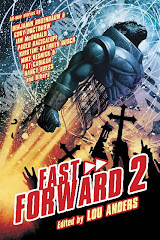
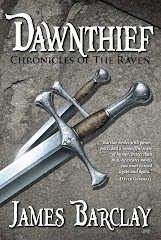

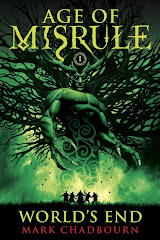.jpg)
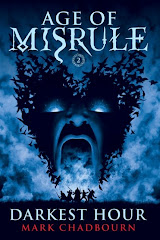

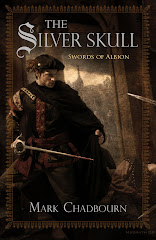


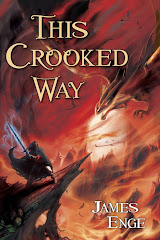
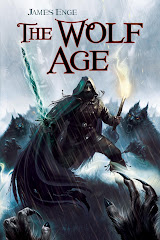



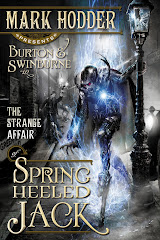


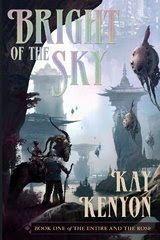.jpeg)
.jpg)
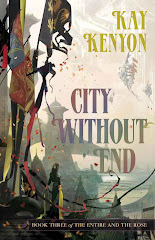


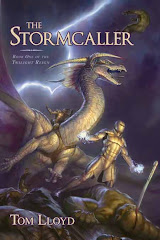

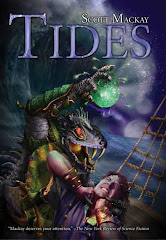

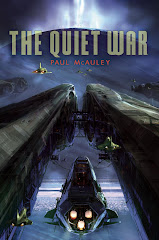



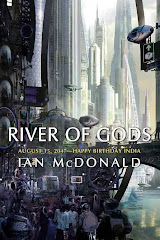.jpg)




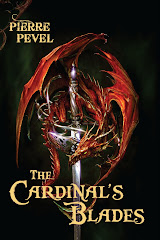


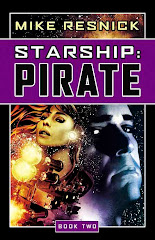
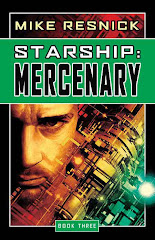

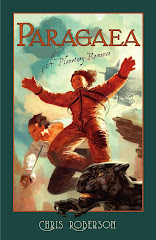
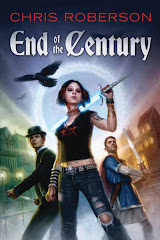


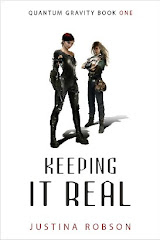.jpg)
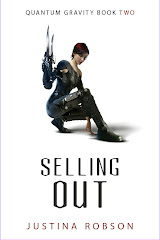
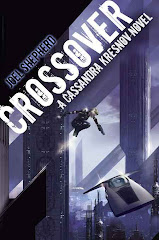
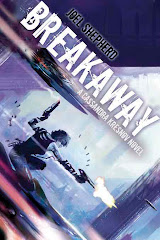
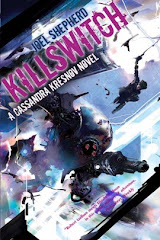.jpg)

